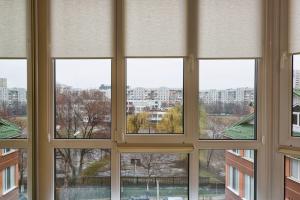The Republic of Moldova is almost entirely dependent on energy imports as it has no domestic sources of fossil fuels and makes only limited use of its renewable energy potential. At the same time, the energy intensity in the country is 3.4 times higher than the average energy intensity in the countries of the European Union. That makes improving energy efficiency and increasing the share of renewable energy in all economic sectors critically important, including in terms of protecting its energy security. Energy consumption of buildings represents 58% of the total final energy consumption in the country. Non-residential buildings account for 17% of this figure, which makes improving energy efficiency in this sector of paramount importance.
While energy efficiency (EE) and renewable energy (RE) measures and equipment are available in the country, a significant challenge is the cost of introducing them and subsequent return on investments. Assessing the costs and benefits of such measures and acquiring and maintaining EE and RE equipment is therefore an important step. In response to the request from the Government of the Republic of Moldova, UNECE has developed a Guide for the implementation of energy efficiency measures and valorization of renewable energy sources for public sector buildings. It is intended to support the efforts of the Government to improve energy efficiency and increase share of renewable energy resources in the country, particularly in response to the energy crisis. Public sector buildings, such as schools, kindergartens, hospitals, and cultural centres, are considered in the Guide.
The Guide aims to support those responsible for ensuring energy efficiency and use of renewable energy in public buildings under the authority of the national Government and local public administrations. It can be used in the process of preparing a pre-feasibility study to identify EE measures and use of RE equipment and assess the investment costs depending on the measures selected and the financial resources available. The guide provides recommendations for energy auditors on how to select and justify energy efficiency measures for public buildings.
The Guide also provides an overview of the existing situation, including legislation and statistics for energy consumption in buildings, description of measures for energy efficiency and utilization of renewable energy sources, which include their technical characteristics, and an estimate of the values of the proposed measures and their construction cost index. In order to achieve the minimum energy performance requirements and improve the comfort of those using the buildings, three sets of measures are proposed: legislative measures such as mandatory energy audits; technological measures and building materials like thermal insulation of the buildings envelope elements, replacement of doors and windows, energy efficient lighting systems and monitoring systems; and systems and equipment such as a change of the energy source that includes utilization of renewable energy and improvement of the heating system (e.g., replacement of boilers with heat pumps).


